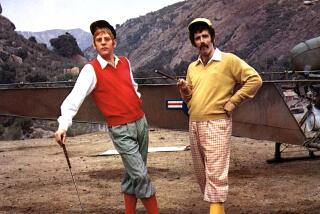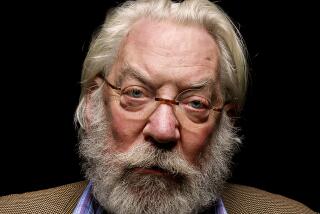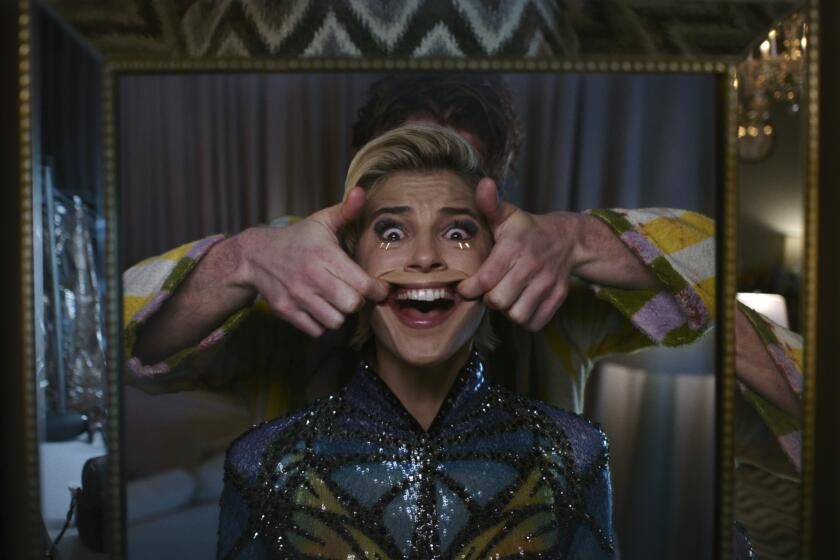‘Bull Durham’: Once and Always Original
Writer-director Ron Shelton hasn’t seen the new special-edition DVD of his 1988 baseball comedy “Bull Durham” (MGM, $25), although he did participate in the new documentary featured on the disc that arrives in stores today. He’s also featured on a commentary track--but that was recorded four years ago for the movie’s laserdisc release.
“I just said what came into my mind,” Shelton recalls. “I’ve never even heard it. I get more letters about that commentary and I don’t even know what I said.”
It’s not that Shelton has anything against the laser or digital formats. He just doesn’t have much use for all the frills. Unlike most special-edition discs, there are no deleted or alternate scenes included on the “Bull Durham” DVD.
“I don’t have a different cut or edit from the original,” Shelton says. “I figure that’s how I saw it at the time and that’s how I’ll live or die with it. That is not to say you wouldn’t re-cut the movie differently any time in your life. It’s just how I did it then and that’s how I’ll let it stand. I like DVDs to watch the movies, but I don’t really want to know what someone is telling [on the commentary] because their job is telling me in the story.”
Named by Sports Illustrated as the No. 1 sports movie of all time, the racy, romantic and funny baseball tale stars Kevin Costner as an aging minor league catcher, “Crash” Davis, who is transferred to the Durham Bulls in North Carolina to train and discipline the Bulls’ cocky young pitcher, “Nuke” LaLoosh (Tim Robbins). Susan Sarandon plays the sexy baseball groupie, Annie Savoy, who each season picks one player to “train” and “nurture.” And this year, she’s decided that both Nuke and Crash are her “draft picks.”
“Bull Durham,” which was shot on location in Durham and several other minor league cities in the Carolinas, offered Costner one of his best roles and made Robbins a star. (The two actors are featured on a separate commentary track on the DVD.) Sarandon and Robbins became a couple during the production, and Shelton is godfather to their first child, Jack Henry.
Shelton, who made his directorial debut with the comedy, won the Writers Guild of America Award for his script and received an Oscar nomination for best original screenplay.
The film’s baseball scenes are some of the most authentic ever put on screen--and for good reason: Shelton played minor league ball for the Baltimore Orioles for six years. “I played A ball through Triple A,” he says. “I played mostly second base.”
Though minor leaguers get paid next to nothing and spend most of their professional lives traveling from game to game on a bus, Shelton says it was the best time of his life. “It is also a nervous time,” he adds. “You are terrified of being cut loose. Everybody is getting the pink slip, and you have to perform every day or you are going to be cut loose. Everything you do is being translated into statistics for all time. Everything I ever did you can look up the record on. It certainly prepares you for anything else in the world, including making movies.”
Besides “Bull Durham,” Shelton has looked at the world of basketball in “White Men Can’t Jump,” golf in “Tin Cup” and boxing in “Play It to the Bone.” But he’s never been fond of sports movies.
“I hated ‘The Pride of the Yankees,’” he says, referring to the 1942 classic about Yankee great Lou Gehrig, played by Gary Cooper. “It was my mother’s favorite movie, and I could never tell her how awful it was. As an adult, it is even worse. I think most of the sports movies are told from the fan’s point of view. I try to tell them from the player’s point of view.”
When Shelton wrote the script of “Bull Durham,” sports movies were box-office poison. Though only budgeted at $7 million, everybody turned it down, he says. “People liked the script but they were afraid of me as a first-time director,” Shelton says. “They were certainly afraid of the subject of baseball.”
Ultimately, Shelton had 30 days to get the movie off the ground with Costner. “Then he was going to have to commit to something else,” Shelton says.
On the 29th day, the script was sent to Orion Pictures’ East Coast office. “Orion on the West Coast had already turned it down twice,” Shelton says. But Orion executive Bill Bernstein read it that Thursday night and by 3 the next afternoon--the 30th day--Shelton had a deal. “Five weeks later we shot the movie.”
Because Shelton got the green light so late in the year, “Bull Durham” was filmed in October and November. “It was freezing,” says the director. The grass was changing color, so the production staff continually had to paint the baseball field green. Many of the baseball scenes were shot at night to camouflage the fact that the leaves were also turning brown.
Making the movie was fun, but Shelton says he wasn’t sure he’d ever work again. “You never know if a movie is going to be successful,” he explains. “It didn’t test particularly well. When it opened and got all of those reviews and people were going crazy for it, I was the most shocked guy in the world. I am delighted that the movie seems to have found such a life of its own.”
More to Read
Only good movies
Get the Indie Focus newsletter, Mark Olsen's weekly guide to the world of cinema.
You may occasionally receive promotional content from the Los Angeles Times.











